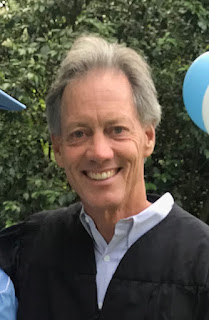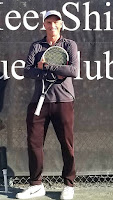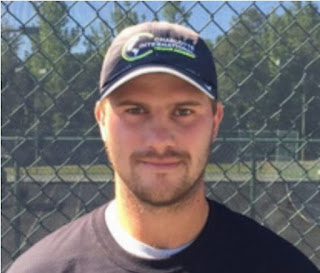OPRC Member Spotlight: Pender Murphy
Pender Murphy is a native of Charlotte, attended Charlotte Latin, and would go on to work in commercial real estate for 25 years. He played tennis at Latin, Clemson University, and professionally for three years. Now, he provides tennis instruction to various schools and organizations in Charlotte through TLA Tennis, named in honor of Andy Avram’s late son, Tucker Leighton Avram.
Pender has fond memories of playing matches as a kid at Olde Providence on Tuesday nights against players such as Bane Shaw (Ashley’s father), and William Poore.
Murphy was a ball boy at Olde Providence in 1970 when a 15-year-old Chris Evert beat Margaret Court, just two weeks after Court achieved the Grand Slam. Later, he would serve as a ball boy at the Davis Cup final at OP in 1971 when the Stan Smith-led USA team defeated Ilie Nastase, Ion Tiriac, and the Romanian team. He recalls, “Back then, the ball boys at the baseline would throw the ball to the opposite baseline versus rolling it halfway to the net person. Ed Hopper’s umpire chair occasionally got clipped, but I think it was the better way.”
Pender has been married to his wife Patti for 32 years and the couple has two children, Farrell (29 living in LA) and Tricia (26 living in Memphis).
What would you say is your biggest tennis accomplishment or most memorable moment?
I won the NC State Boy’s 16 and under championship. In the finals, I beat a player I had never beaten. I had never beaten him partly because he was better, partly because he was inclined to call many of my balls out that were in. Obviously, he won those points, plus it rattled me. The match came down to a 3rd set tiebreaker. This was back in the days of the 5-out-of-9 tiebreaker. I was down 2-4 in the breaker, then won two points to make it 4-4, so now it’s simultaneous match point. I won it. I can’t remember how, though I remember going to lengths not to have to hit a backhand.
I should also mention the 1980 ACC Championships where my partner and I, in the finals of #2 doubles, were up a set and 4-0 in the second set tiebreaker. We lost two points, so now it’s 4-2 but my partner has the last 3 serves. He has the biggest serve in college tennis. He later went on to a top 20 ATP ranking. He double faults twice, then misses a sitter volley. We lose the set, then the 3rd. I don’t enjoy throwing him under the bus. Maybe I should have cut off the sitter.
What is the biggest lesson you have learned in tennis?
As with the two memories I recalled above - there will be highs and lows.
How has tennis helped you in life?
It helped me get my first real-world job. I think either directly or sometimes a little bit indirectly, it has led to nearly all my friendships. It led to meeting my wife. (Clearly, I listed these in reverse order of priority). Exercise and joy are vital in life. Tennis provides the opportunity for both. I never take it for granted.
What is one piece of advice you could give about the sport?
There aren’t many life-time sports. This is the best one. I hear people sometimes say, “Oh, I wish I had learned the game earlier..” You may be a little better if you had, but what matters is the love for the game now.
In your opinion, what is the best quality to have in tennis?
Patience is high on the list. As you age, having a drop is a significant plus. I’m not sure that’s a quality, per se.
What is the biggest difference you see in the sport from the time you began playing?
When I started playing in the early 70’s, hardly anyone had a two-handed backhand. Now the vast majority of males do, and virtually all the females do. And there’s so little serve and volleying. Also, things were much less structured when I was growing up. I’d meet my buddies at the courts, and we’d play. Or sometimes I’d just get to the courts early and sit around until someone would come along who I could hit with.
How do you see the sport evolving in the future?
On the professional level, I think the trend will continue toward taller, stronger players with big serves. With the occasional Schwartzman (and though I love him, hopefully not too many John Isners). For those players who aspire to win a major title, they’ll understand superhuman fitness is required.
If you were to change one thing about the sport, what would it be?
I don’t how to do it, maybe every coach/instructor in the country needs to be a broken record in addressing it with their players - but in junior and college tennis, we need to get back to the maxim, “If you’re unsure whether it was in or out, then it was in.” Which means maybe you’ll play some out balls.



Comments
Post a Comment